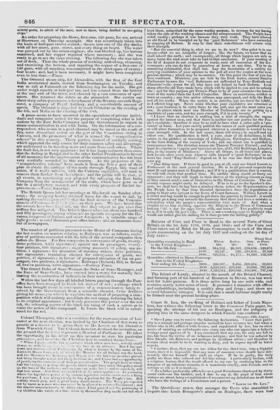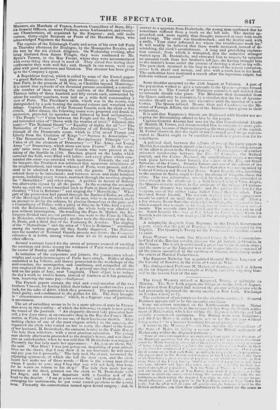- Count St. Leu, the ex-King of Holland and father of'
Louis Napo- leon, has written the following letter to the Commerce Paris paper, re- specting the attempt of his son on Boulogne, and the indignity of placing him in the same dungeon in which Fieschi was confined—
Florence, 24t1u August.
" Sir—I pray you to receive the following declaration. 3 know that publi- city is a strange and perhaps singular method to have recourse to ; but when a father who is old, afflicted with disease, and expatriated by law, has no other means of assisting tin unfortunate son, every one who can appreciate a father's fierliugs must approve of it. I ant convinced that my son, the only one left to me, has been time victim of an it.famous intrigue ; and that he was Reduced by false friends, vile flatterers, and perhaps by insidious advice; and therefore to remain silent would he to be wanting in duty, aud to expose myself to bitter regrets. • " 1 declare, then, that nay son has fitllen for the third time into a frightful snare, Sillee it in, inn. posdblc that tiny man of C0111111011 sense should have deli- berately thrown himself into such an abyss. If lie he guilty, the truly guilty are those who seduced 111111 led hint astray. I particularly declare, with n religious horror, that the insult offered to my son hy confining him in the dungeon of an infamous assassin, is a monstrous cruelty, anti-French, and an outrage us Vile its it is illSilliOUS. " A!4 it father profoundly afflicted—as a good, Frenchman chastened by thirty years' exile—as the brother, and, I dare to say it, the pupil of him whose statues are about being rei;stahlialmed—I recommend my deluded sun to all those who have the feelings of u Frenchman and a parent.
" LOUIS DE Sr. LEU."
The Quo/Zen:re states, that amongst the l'eers who assembled to inquire into Louis Bonaparte's attack on Boulogne, there were four Ministers, six Marshals of France, fourteen Councillors of State, fifty- six General Officers, nineteen Prefects, seven Ambassadors, and twenty- one Chamberlains, all appointed by the Emperor ; and, still more curious, thirty-eight Senators or Peers of the Hundred Days, who acknowledged Napoleon the Second.
The captain of the Edinburgh Castle and seven of his crew left Paris on Thursday afternoon for Boulogne, by the Messageries Royales, and the rest by the six o'clock diligence. On Wednesday evening, after being liberated from Sainte Peragie, they were conducted to Mr. Byron's Tavern, in the Rue Favart, where they were accommodated with every thing they stood in need of. They stated that during their confinement they were well fed ; and, though in one room, were sup- plied with good mattresses and blankets. The steamer has been given up to the Company's agent.
A Republican festival, which is called by some of the French papers " a grand Reform dinner," took place on Monday, at a short distance from Paris, in the grounds of M. Gay, at Chatillon beyond Montrouge. It is stated that upwards of six thousand persons assembled, a consider- able number of them wearing the uniform of the National Guard.
Thirteen tables of three hundred and fifty covers each, surrounded by others for smaller numbers, were laid on a wide field commanding a view of Paris. The President's table, -which was in the centre, was distinguished by a pole bearing the national colours and wreathed with foliage. Captain Recurt, of the National Guards, took the chair at five o'clock. After dinner, the following toasts were proposed and drunk in succession, preceded by speeches and followed by loud acclamations: " The People "—" Union between the People and the Army "—(Loud and reiterated cries of t' Down with the treaties of 1815! " followed this toast)—" The National Guard"—" Equality of rights for all"—" The Nationality of France "—" The Abolition of all Privileges "—" The triumph of the Democratic cause, which in 1792 saved France and Liberty from the Coalition of Kings "—" Success to Association "— " The Democratic Press "—" The Revolutionary Principle "—" A Union of all the elements of Democracy "—" The Army, our Young Army "—" Democracy, which alone can save France." At the stew- ards' table were two old National Guards who were present at the taking of the Bastille in 1789. Benches, placed on the banks which surround the field, were filled with ladies ; and every place which com- manded the scene was crowded with spectators. Towards the cud of the banquet, the President was informed that numerous inhabitants of the neighbourhood, and some workmen of Paris, were present, and de- sired to be admitted to fraternize with the guests. The President ordered them to be introduced ; and between seven and eight hundred persons, including many women, marched through the meeting, singing the " Marseillaise" and other songs. A petition • in favour of Reform
was afterwards signed by all the guests. In the evening the assembly broke up, and the crowd marched back to Paris in lines of four abreast, shouting " Vive la Reforme!" and singing the " Marseillaise." When part of the procession had passed through the Barrier d'Enfer, an officer of the Municipal Guard, with ten of his men, who were mounted, made an attempt to divide the column, by placing themselves at the gate; and a Commissary of Police, with a party of Sergens de Ville, held a parley with the Reformers ; but, ultimately, the whole body was allowed to pass without interruption. On reaching the Place St. Michel, the Re- formists divided into several portions : one went to the Place de l'Ecole de Mddecine, where it dispersed ; another took the direction of the Rue St. Denis, and a third that of the Faubourg St. Antoine. The singing of the " Marseillaise " and the cries of " Vire la Reforme!" continued among the various groups till they finally dispersed. The Nati:mud says the number of National Guards present was 3,000 ; the Commerce estimates it at 2,000, among whom were 25 or 30 captains and 123 other officers.
Several warrants issued for the arrest of persons accused of exciting the meetings and strike among the workmen of Paris were executed in the course of Sunday and Monday.
In imitation of the carpenters and joiners, the journeymen wheel- wrights and coach-ironmongers of Paris have struck. Bodies of them assembled at La Villette, and thence proceeded to the workshops of the mail-coaches, the messageries, and omnibuses, and compelled all the men employed there to join them. A general meeting was afterwards held on the plain of Issy, near Vaugirard. Their object is to reduce the day's work to twelve hours, instead of fourteen as it has generally been, receiving the same pay.—Gelignane
The French papers contain the trial and condemnation of the two brothers Vincent, for having killed their father and mother twelve years back, for the sake of £200, which they possessed. The parricides were found guilty, and condemned to the gullies for life. The Jury brought in " eirconstances attenuantes ;" which, in a flagrant ease of parricide, is uncommon.
The art of swindling seems to be in a more advanced state in France than even in this country : of which the following example is now going the round of the journals. " An elegantly-dressed lady presented her- self, a few days since, at an extensive shop in the Rue des Fosst..s Mont- martre, at Paris, and asked to see one of their handsome shawls. After making choice of one of the most elegant articles in the magusin, she requested the clerk who waited on her to carry the shawl to the house of her husband, M. Desirabode, the eminent dentist in the Palais Royal. The lady then withdrew, with a most gracious salutation. The young loan shortly afterwards proceeded to the dentist's house, and was shown into an antechamber, when he was told that M. Desirabode was engaged. Presently the fine lady made her appearance : Ali, you are there, Sir.' she said. 'Mon Dien! I was just going out, despairing of your arrival. Give me the shawl, that I may show it to toy husbend ; he will come and pay you for it presently.' '1'he lady took the law I, renntered the adjoining apartment, of Which she left the door open, and the clerk heard her make use of these 'words—' Here is the young man about whom I spoke to yon : may I beg that you will not keep him long, for be wants to return to his shop ?"The lady then made her ap- pearance at the door, pointed out the clerk to M. Desirabode with her finger, and took her departure with a familier nod of the head to the dentist. • 1 am at your service Sir; said Desirabode ; and, arranging his instruments, he put some casual questioos to the 3.oting 711311. Presently the conversation turned upon dental surgery ; and, in answer to a question from Desirabode, the young man confessed that he sometimes suffered front a tooth on the left side. The dentist ap- proached, and, more rapidly than thought, removed at once both tooth and twinge. The clerk was thunderstruck ; and the dentist said, with a smile, 'Your sister informed me where the troublesome tooth lay.' It will readily be believed that these words increased, instead of di- minishing, the clerk's astonishment. A long and provoking explana- tion ensued; from which it transpired, that the seductive stranger waited upon N. Desirabode, and entreated him to remove by surprise an unsound tooth from her brother's left jaw, she having brought hint to the dentist's house under the pretext of showing a shawl to his wife. The poor clerk returned to his shop in a state of the utniost confusion, minus both shawl and money, and also with a tooth less in his head. The authorities have instituted a search after the ingenious culprit, but hitherto without success."



























 Previous page
Previous page